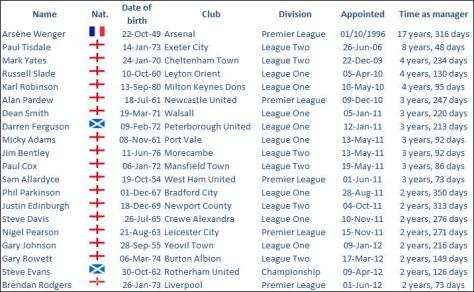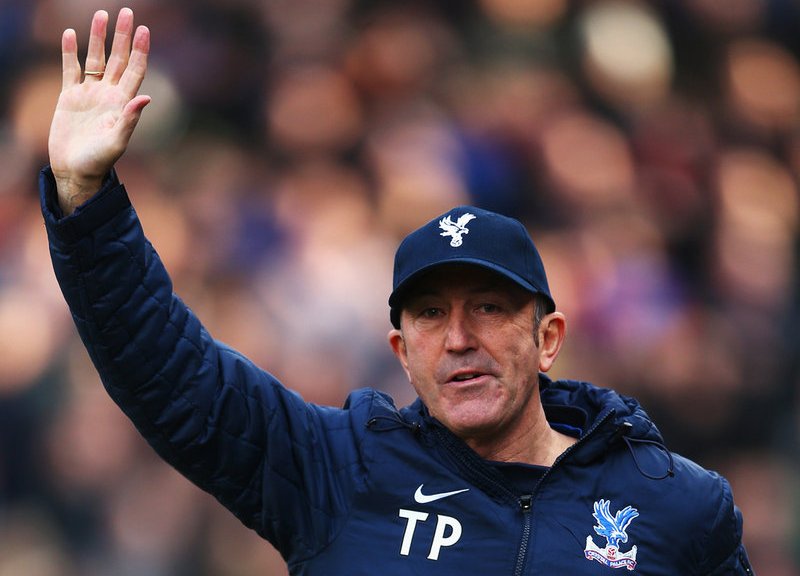Tony Pulis’ departure from Crystal Palace just 2 days before the start of the new season, began football’s annual managerial merry-go-round; illustrating the precarious nature of a football manager’s position in England’s professional leagues.
Each new Barclays Premier League season sees punters race to predict who will take the ignominious title of being the first manager to leave his post.
Manchester United manager Louis van Gaal’s time as the Premier League’s new boy was short-lived, and incredibly 2013/14 “Manager of the Year” Pulis, was not the first league boss to leave his position, with Championship side Huddersfield Town having parted company with manager Mark Robbins just 24 hours after the start of their season.
FIRST MANAGER TO LEAVE HIS POST IN PREVIOUS PREMIER LEAGUE SEASONS:
2013/14 – Paolo Di Canio (Sunderland), 20th in table, 22/9/2013
2012/13 – Roberto Di Matteo (Chelsea), 3rd, 21/11/12
2011/12 – Steve Bruce (Sunderland), 16th, 30/11/11
2010/11 – Chris Hughton (Newcastle United), 11th, 6/12/10
2009/10- Paul Hart (Portsmouth), 20th, 24/11/09
With time and patience in short supply, the average tenure of a manager in the top 4 divisions of football in England & Wales is now less than 2 years. Indeed just 4 of the league’s 92 clubs have enjoyed the same sporting leadership for more than 4 years. Whilst gambling on a new manager can be the difference between survival and relegation; making a change is by no means a guarantee of results as Fulham, Cardiff and Norwich City all found to their cost last season.

From a starting position 6 points adrift of safety in November, Tony Pulis performed heroics in guiding Crystal Palace to survival with 3 games to spare in April. However, his relationship with co-chairman Steve Parish apparently broke-down over the club’s failure to deliver his transfer targets . Palace, a club who have faced administration twice in 15 years, must target long-term stability as well as results on the pitch, and now face the challenge of appointing a successor capable of instilling the same survival spirit embodied in last year’s team, whilst living within the club’s financial means.

Arsène Wenger became England’s longest-serving football manager when long-time rival Sir Alex Ferguson retired after 27 years in charge at Old Trafford. Yet as Arsenal’s Wenger, (having delivered last year’s FA Cup to end a 9 year trophy drought) looks set to enter his 18th year in top-flight football management; examples of leadership longevity are seldom followed in football’s boardrooms. A case in point being David Moyes’ ill-fated spell as Sir Alex’s successor at Manchester United.
The Premier League’s 2nd and 3rd longest serving bosses, West Ham’s Sam Allardyce and Alan Pardew of Newcastle United; are regularly touted amongst the favourites to join Pulis in looking for their next position. Allardyce’s “vote of confidence” from the West Ham board at the end of last season came with the veiled threat that results and the style of football at the Boleyn Ground must be improved. “Big Sam” must satisfy the Hammers’ board and fans that he is the right man to lead the club towards a new dawn at the Olympic Stadium in 2016. Pure survival is not enough. Fans expect to be entertained and club directors need a paying public in order to fill increased capacities.
Results are not the only factor and personality goes a long way in Premier League management. The ability to confidently present one’s self well in front of the TV cameras and maintain media relations is perhaps as important a competency for the modern manager as coaching. A Premier League manager is the embodiment of a club’s identity in suit and club tie. Sometimes a face simply doesn’t fit with a club’s image; particularly true when new owners take on the stewardship of a football club and decide the existing manager should be replaced with their own man.
The advent of social media and 24-hour rolling news channels means supporters voices must now be heard and heeded. Premier League chairmen can find their own positions under fire. However, whilst losing 3 games in a row can now be seen as a “gross misconduct” offence for a manager; making repeated recruitment related errors of judgement rarely sees a board of directors ousted.
The cost of compensation paid to sacked managers and lack of cohesive strategy for player recruitment and development, can set a club’s progress back decades. In an age of “Financial Fair Play,” struggling clubs may find that they simply can not afford to remove a highly paid manager. Whilst supporters may continue to gamble on the managerial merry-go-round and the sack race, football clubs themselves may find that cold financial reality precludes them from doing so.
Of course football managers often leave clubs of their own volition in search of greater glory at bigger clubs. In a game where hunger for success is often an admired quality; neither football chairmen, fans or managers should be surprised by a lack of loyalty.
Long-term relationships, in football at least, are hard to come by.
WHO DO YOU THINK WILL BE THE NEXT PREMIER LEAGUE MANAGER TO LEAVE HIS POST?
WHAT CAN THE WORLD OF BUSINESS TEACH FOOTBALL IN TERMS OF RECRUITMENT AND SUCCESSION PLANNING?


Wouldn’t surprise me if he’d been tapped up by another club.
Andy Dewar
St Albans, Herts, UK